
Children of Gaza Crisis
Home
Current Appeals
Children of Gaza Crisis
Children in Gaza have been pushed to the brink.
UNICEF remains in Gaza delivering supplies and services, despite very low stock levels due to the ongoing blockade of humanitarian aid. We have 120 staff on the ground and the equivalent of over 1,000 truckloads of supplies ready to deliver into Gaza. At this critical time, it's vital that this aid is made available.
It's horrifying that the fighting in Gaza continues and we urge all parties to reinstate the ceasefire immediately.
Nowhere In Gaza Is Safe.
1.7 million children, traumatised by more than 18 months of war, are being deprived of critical life-saving aid.
For months now, aid has been blocked from entering Gaza. This has lead to shortages of food, safe water, shelter and medical supplies. Without these essentials - diseases, malnutrition and other preventable conditions affecting children will continue to surge.
In recent weeks, a small number of trucks carrying aid have been allowed into Gaza. They were full of food, medicines and nutrition items - but it's still nowhere near enough to meet the growing needs of desperate children and families.
We're delivering basic services using our remaining supplies in Gaza, however these are rapidly running out. We have aid stockpiled at the border, which we're ready to deliver and distribute once it's allowed in.
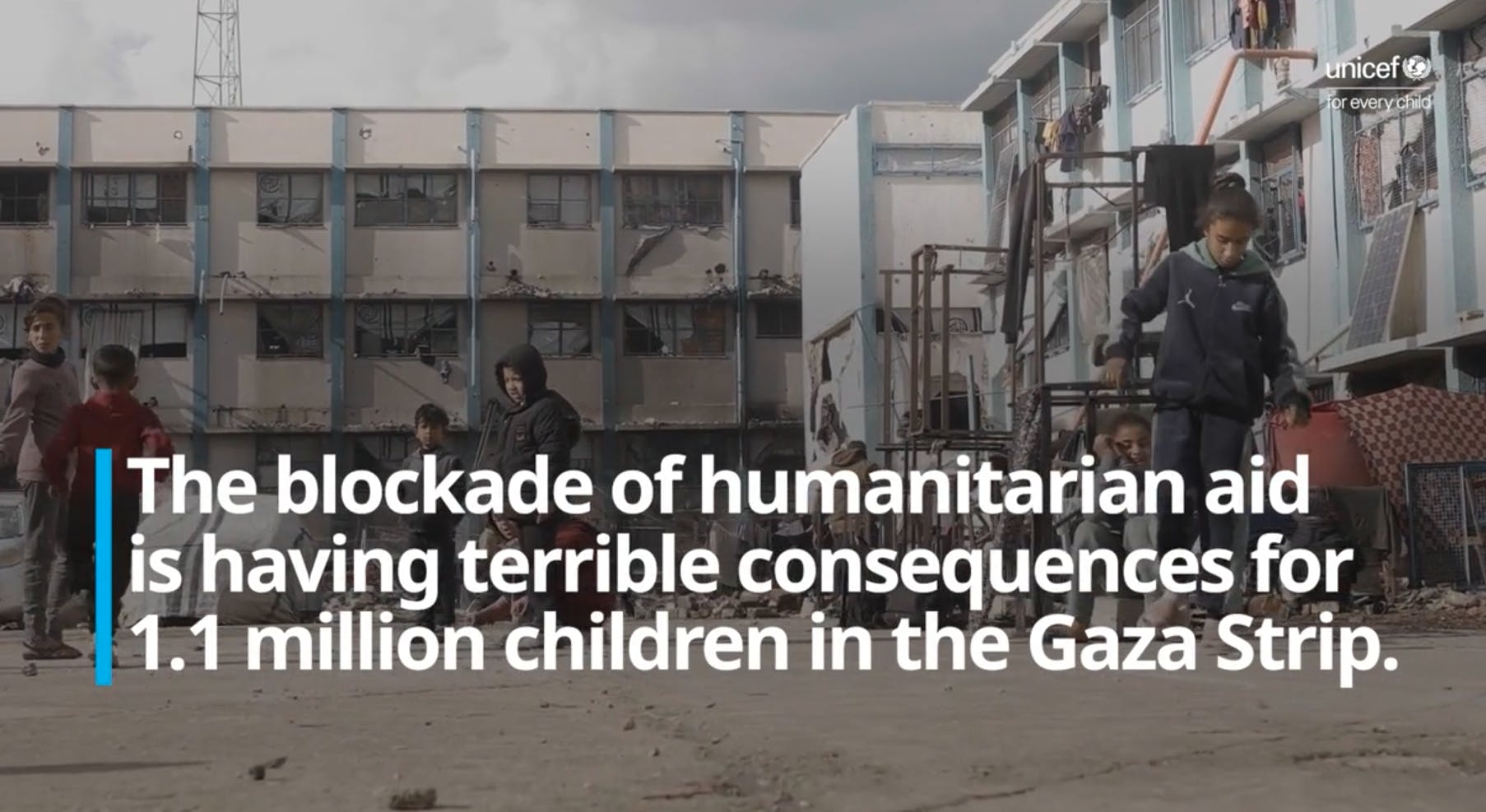
Now’s The Time To Show Your Support For Gaza.
Despite the challenging situation, UNICEF is keeping a critical presence in Gaza.
During March this year, we provided clean water to 1.5 million people and cash assistance to almost 20,000 families so they can meet their essential needs. We're also providing neonatal and maternal healthcare, reaching 8,314 mothers and children via nine mobile health teams. And we treated 2,503 kids for acute malnutrition.
Since the conflict escalated in October 2023, children and families in Gaza have experienced the unimaginable horror of war. Homes, schools, communities and dreams have been reduced to rubble. Severe shortages of essential food, water, and medicine have created a humanitarian crisis.
Now’s the time to show your support for Gaza. Please support children by making a life-saving donation today.
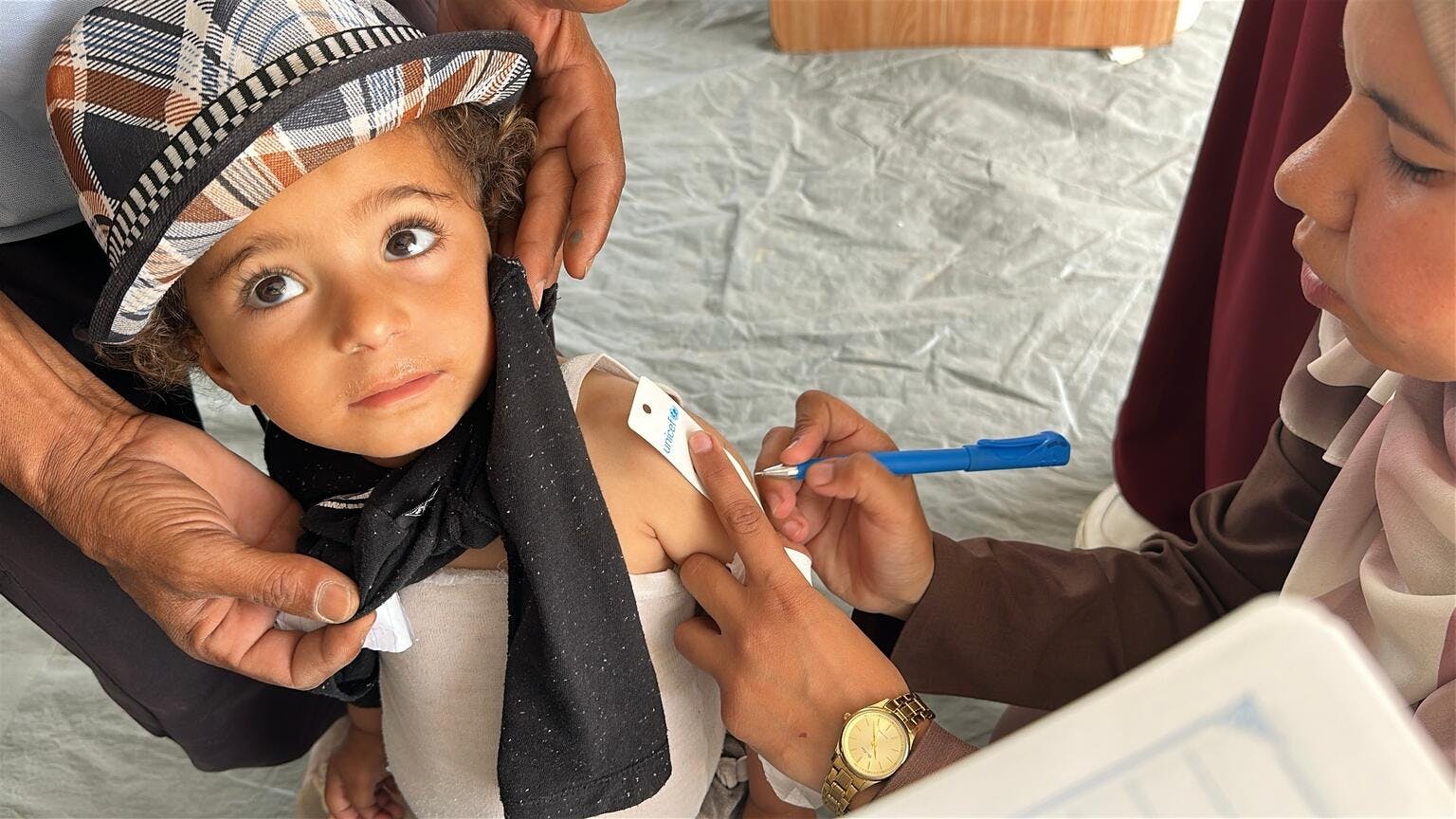
On 7 May 2025, at the UNICEF-supported nutrition clinic in Al Farooq Camp, Khan Yunis, a child is screened for malnutrition using a MUAC (mid-upper-arm circumference) band.
How Can My Donation Make A Difference?
A donation of $51 could provide 10 collapsible water containers and 2,800 water purification tablets to protect kids from waterborne disease.
A donation of $90 could provide 150 packets of ready-to-use therapeutic food to save the lives of kids suffering from malnutrition.
A donation of $119 could provide 1,000 polio vaccines and 2x vaccine carriers to transport them at the right temperature to protect kids from this deadly disease.
A donation of $247 could provide a School-in-a-box Kit with enough learning materials for 40 displaced children to keep up their education.
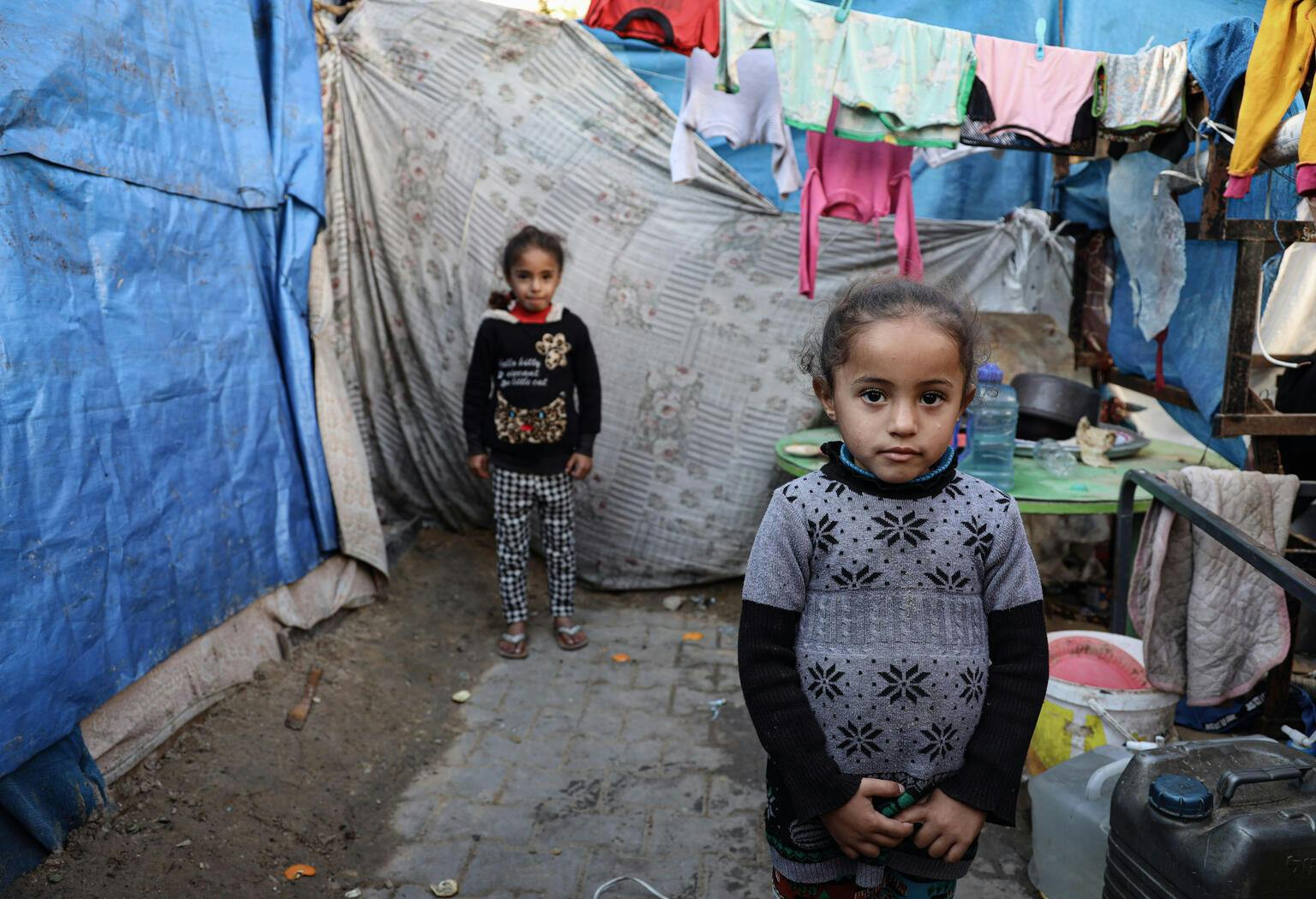
© UNICEF/UNI504113/ alBaba
How's UNICEF responding in Gaza?
A lasting ceasefire is vital for saving children’s lives.
We have critical emergency supplies stockpiled at the border, ready to deliver for children and their families. Humanitarian aid must be allowed to enter and move freely across Gaza.
Since October 2023, UNICEF has reached one in three people in Gaza with humanitarian supplies and services.
We've provided safe drinking water to 2.9 million people; critical water, sanitation and hygiene (WASH) supplies to 638,390 people and medical supplies for more than 250,000 people.
We've provided psychosocial support services to over 314,000 people in Gaza, including more than 208,000 children. More than 210,000 kids have received learning materials and support to continue their schooling. And we've delivered humanitarian cash assistance to 375,692 households.
A ceasefire agreement is a critical first step, but it must be upheld. It is imperative that parties fully adhere to the ceasefire and the desperately needed aid allowed in.
We were on the ground in Gaza long before this crisis escalated more than 18 months ago, and we continue to deliver for kids in the most challenging of humanitarian situations. We will never give up on children in Gaza.
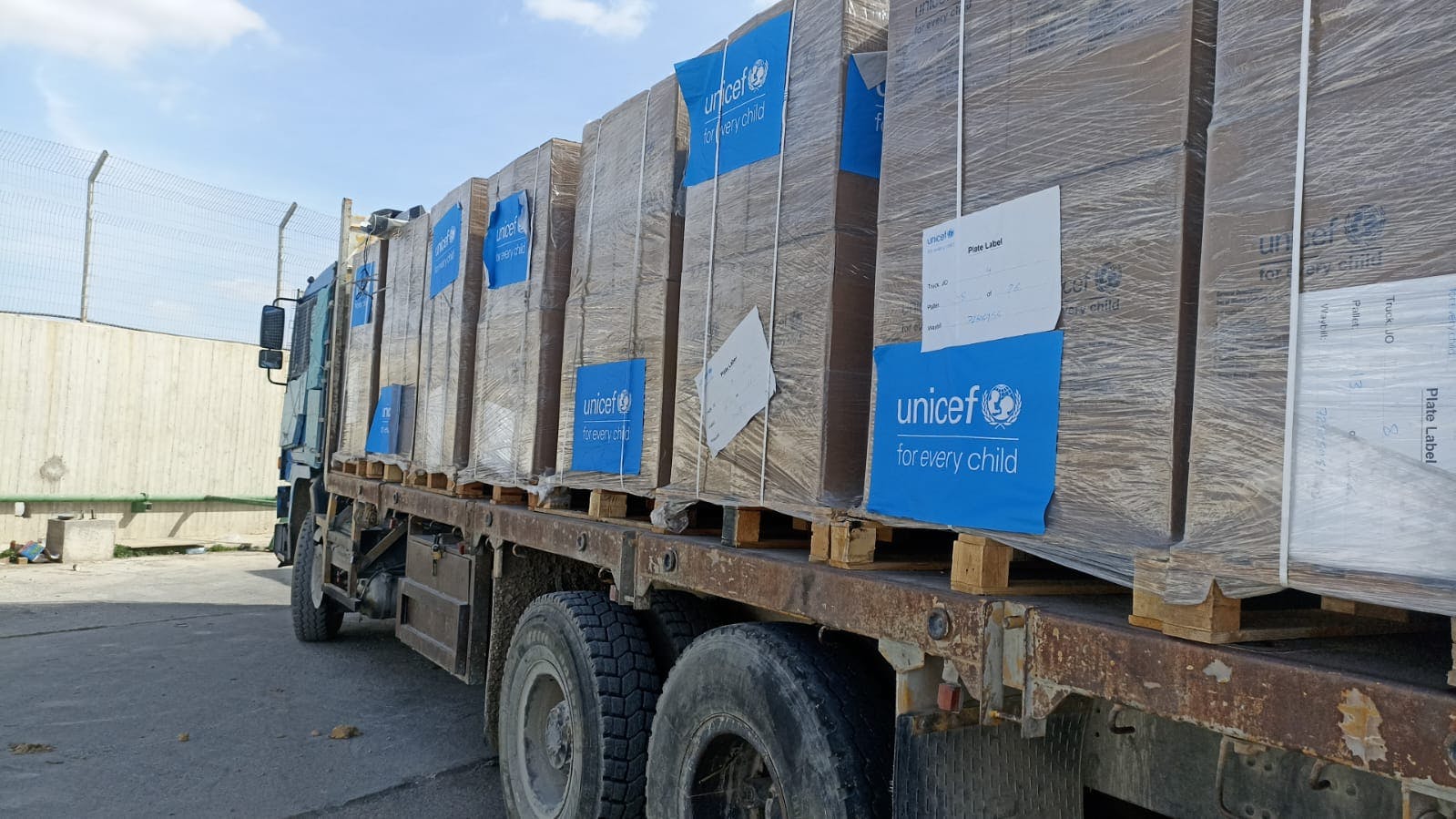
Groundbreaking 3D print prosthetics
A groundbreaking project to 3D-print prosthetic limbs for war-injured children in Gaza is being launched by UNICEF, thanks to funding from FIANZ (The Federation of the Islamic Association of New Zealand).
Funding of more than quarter of a million dollars from the collaboration between FIANZ and UNICEF has allowed a pilot to launch with the pla ning of a production facility in Jordan to 'print' desperately needed prosthetics for Gaza and the wider region.
Gaza currently has the highest number of child amputees per capita in the world. Over 23,000 children have sustained conflict related injuries, and many thousands are facing disabilities and needing long-term rehabilitation.
"This project directly addresses the physical and emotional well-being of children, alongside providing a tangible way to restore hope and dignity" said FIANZ president Ibrar Shaikh, whose organisation has a focus on improving the lives of children, who are often the most affected by conflict.
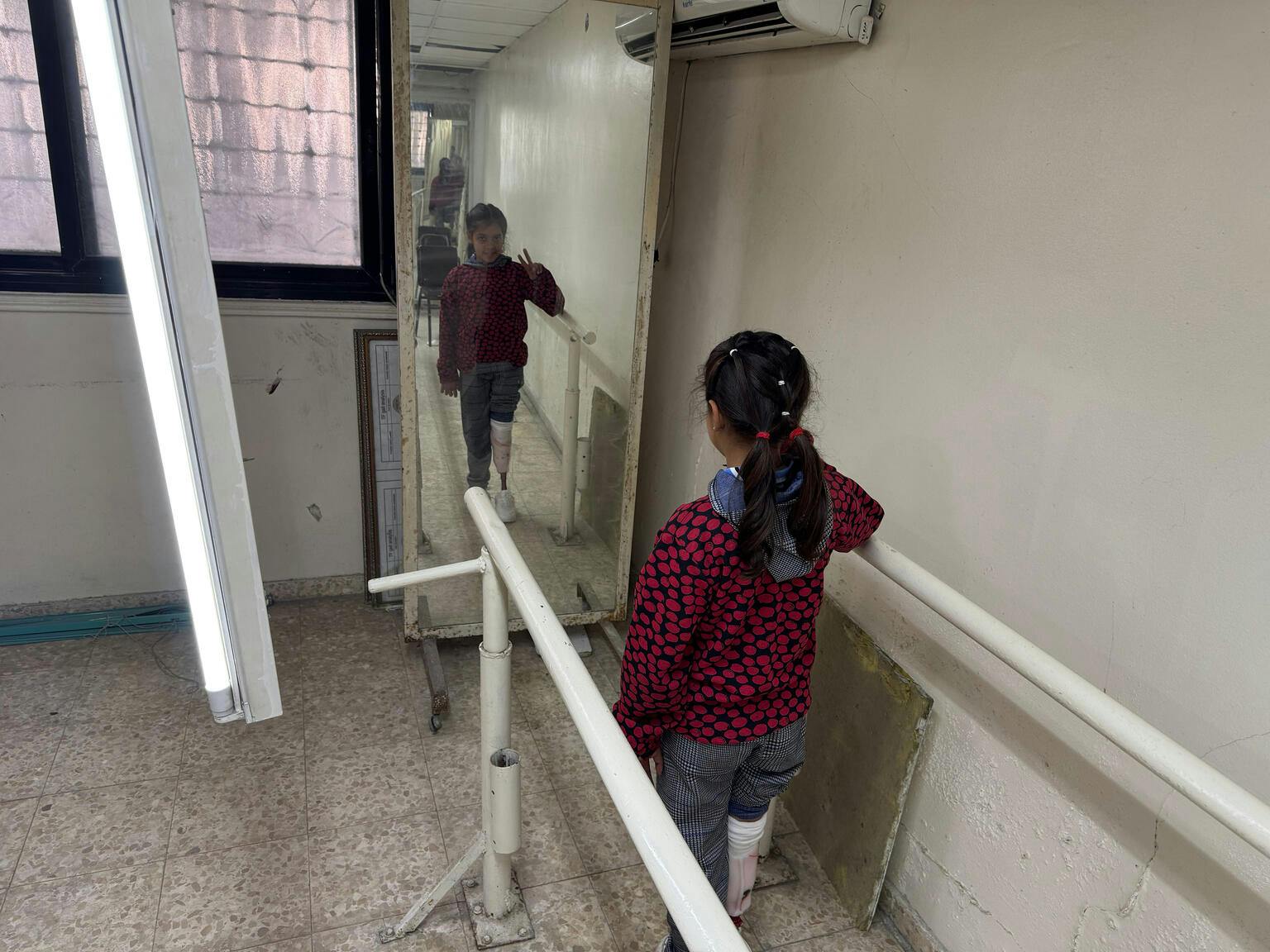
Polio has reemerged in Gaza
A huge concern right now is children’s health and the deadly threat from polio, which has reemerged in Gaza after 25 years. As the sole provider of vaccines for children in Gaza, we're stepping up to protect children from this horrific disease.
Right now, we're undertaking a large-scale polio vaccination campaign. We need 1.6 million polio vaccines, vaccine carriers to transport the life-saving cargo and cold-chain equipment to keep the vaccines at the right temperature to protect kids.
In September last year, around 560 000 children (under ten years old) received their first round of vaccinations against polio. And in November, we completed the second round of the vaccination campaign, reaching 556,774 kids. We've achieved 94% vaccine coverage across the target population, which will help to stop the outbreak and prevent it spreading across the region.
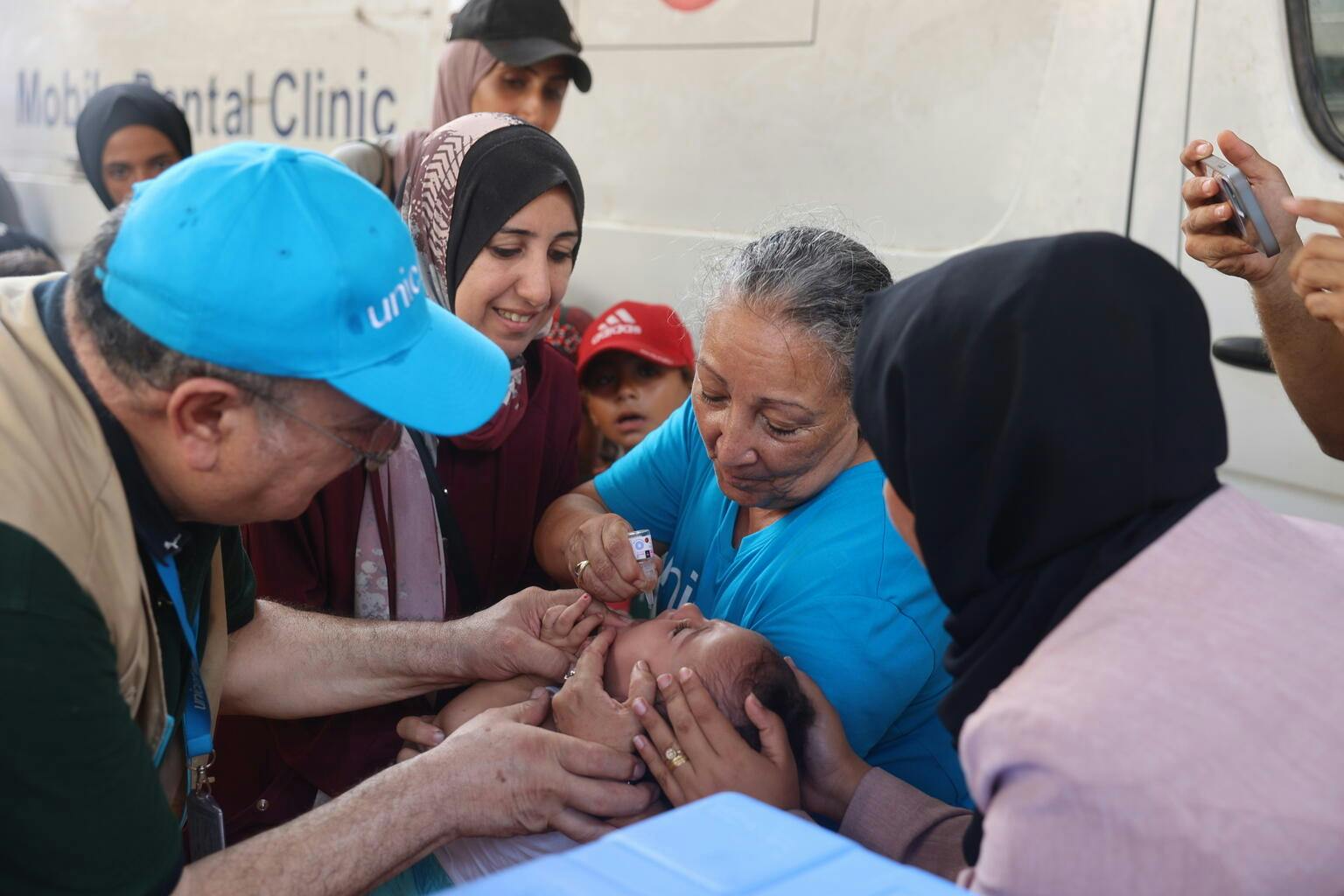
Other ways you can donate
If you'd like to donate over the phone, call our friendly team on 0800 243 575.
If you'd like to donate direct to our bank account, please use account 01-0505-0463764-00 and the code 'gaza-ws'.
Other ways to support kids in Gaza:
Help us spread awareness of the situation for kids in Gaza by sharing this appeal with your friends and family.
If you'd like to fundraise with your community to support our work, you can start a fundraiser here.
Disclaimer:
In the event that funds raised exceed UNICEF's funding requirements, the appeal no longer needs funding, or the decision is made to close this appeal, your one-off or ongoing monthly donation will go to our Greatest Need Appeal. Where possible we will communicate this with you, however in some circumstances this might not be possible.
Your life-saving monthly donations will support this appeal for a period of twelve months. After that they will go into our Greatest Need Fund to save and protect kids worldwide.
UPDATED: 22nd May, 2025
Donate to this appeal
SSL protected donation
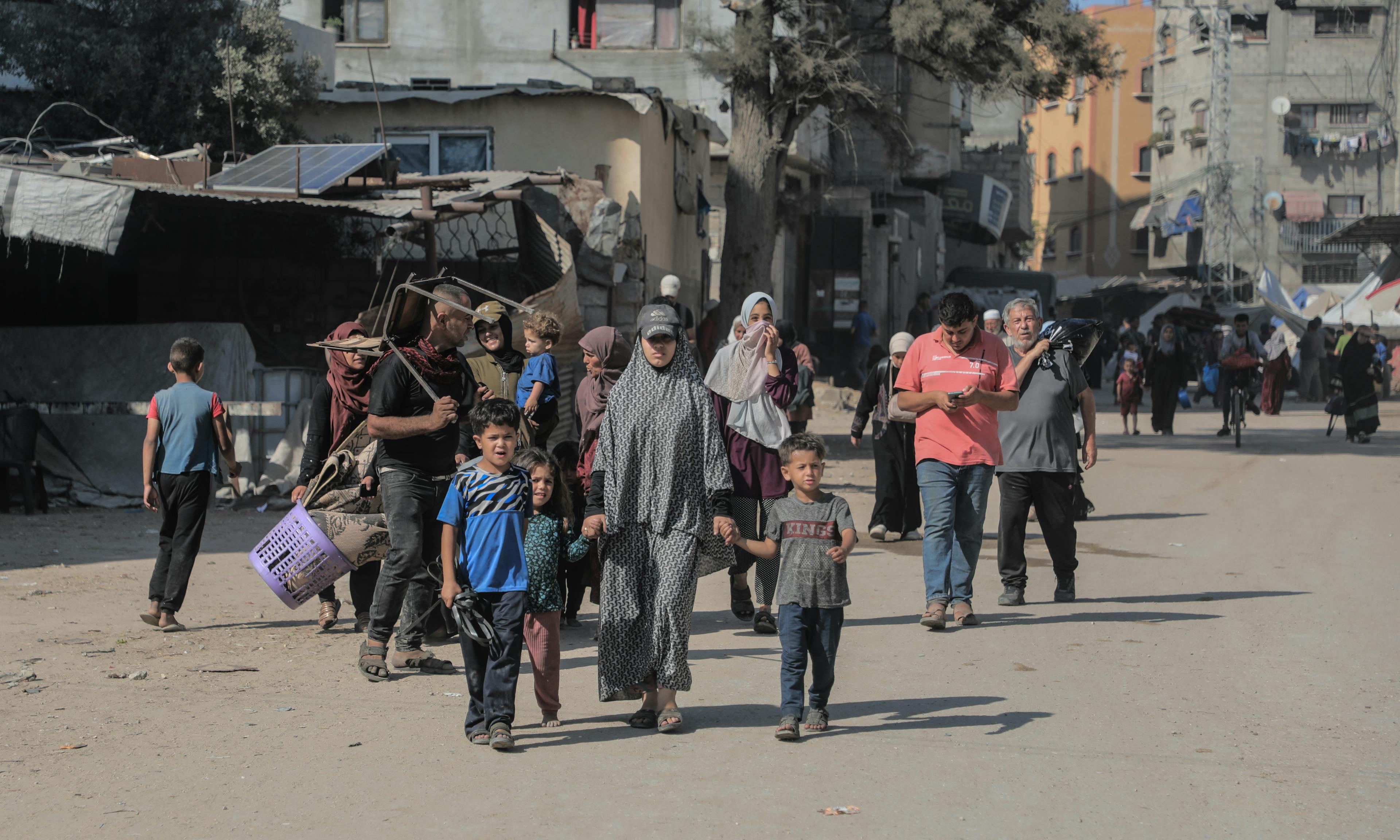
Gaza’s Taps Running Dry: Fuel Crisis Deepens Daily Struggle for Families
This is a summary of what was said by UNICEF Spokesperson, James Elder, to whom quoted text may be attributed – at today's press briefing at the Palais des Nations in Geneva

‘Unimaginable horrors’: more than 50,000 children reportedly killed or injured in the Gaza Strip
Statement by UNICEF Regional Director for the Middle East and North Africa, Edouard Beigbeder

UNICEF statement on the reported killing of 45 children in the Gaza Strip in recent days
It’s now been over two months since any humanitarian aid has been allowed into the Gaza Strip — the longest stretch without relief since the conflict escalation began on 7 October 2023. Combined with more than 18 months of conflict, the ongoing blockade is pushing Gaza’s children to the brink. For two months, children have gone without the food, water, medical care, and support they urgently need. Instead, they’ve been living through constant airstrikes, growing illness, and unimaginable loss.

Risk of famine for children across Gaza, new report says
UNICEF and WFP warn of looming catastrophe as 71,000 children and more than 17,000 mothers are threatened by acute malnutrition.

UNICEF to launch groundbreaking project to 3D print prosthetics for war-injured Gaza children
A groundbreaking project to 3D print prosthetic limbs for war-injured children in Gaza will be launched by UNICEF, thanks to funding from a New Zealand organisation.

World must act with urgency to save Palestinians in Gaza
Statement by heads of OCHA, UNICEF, UNOPS, UNRWA, WFP and WHO

Statement by UNICEF Executive Director Catherine Russell on the attacks in Gaza
Statement by UNICEF Executive Director Catherine Russell on the attacks in Gaza

Palestinian children remain deprived of the most essential supplies and services
Statement by UNICEF Middle East and North Africa Regional Director Edouard Beigbeder

Gaza: 12 months on
It’s been 12 months of unbelievable trauma and grief for millions of people. Kids caught up in the violence have been the urgent focus for thousands of UNICEF staff - both those on the frontlines and those around the world working tirelessly to support the children affected by this conflict. During this time many of our donors and supporters have been asking questions and so we've answered a list of some of the most frequently asked ones.

UNICEF whānau who've been in Gaza from the beginning
These are just a few of the stories of UNICEF’s helpers who've risking their safety and lives every single day for the last 12 months, all of whom have their own families and loved ones.